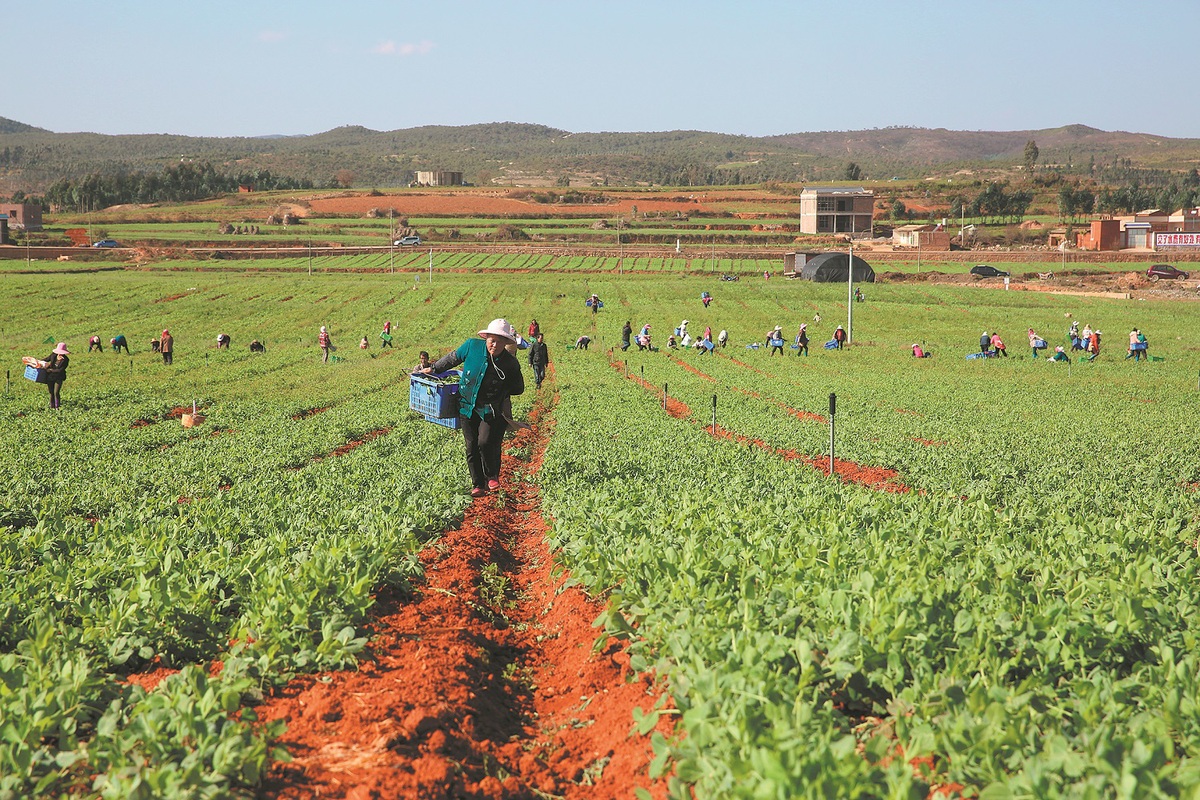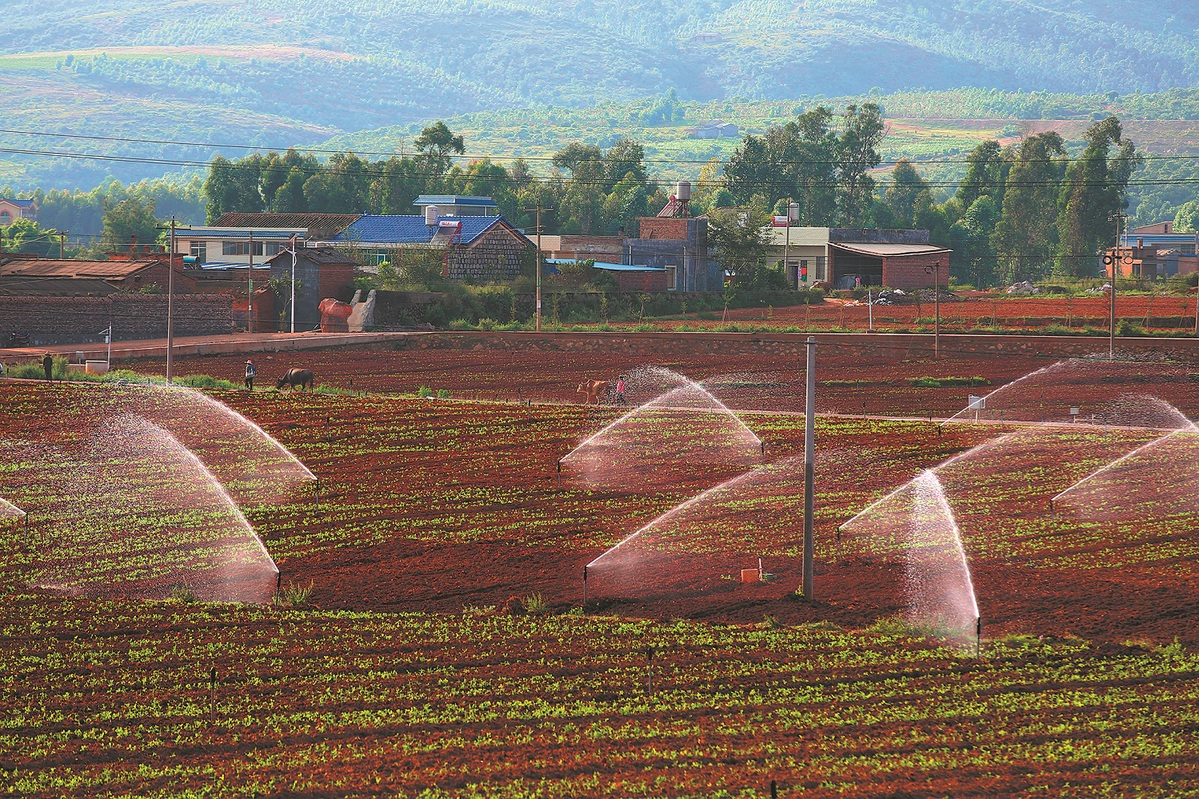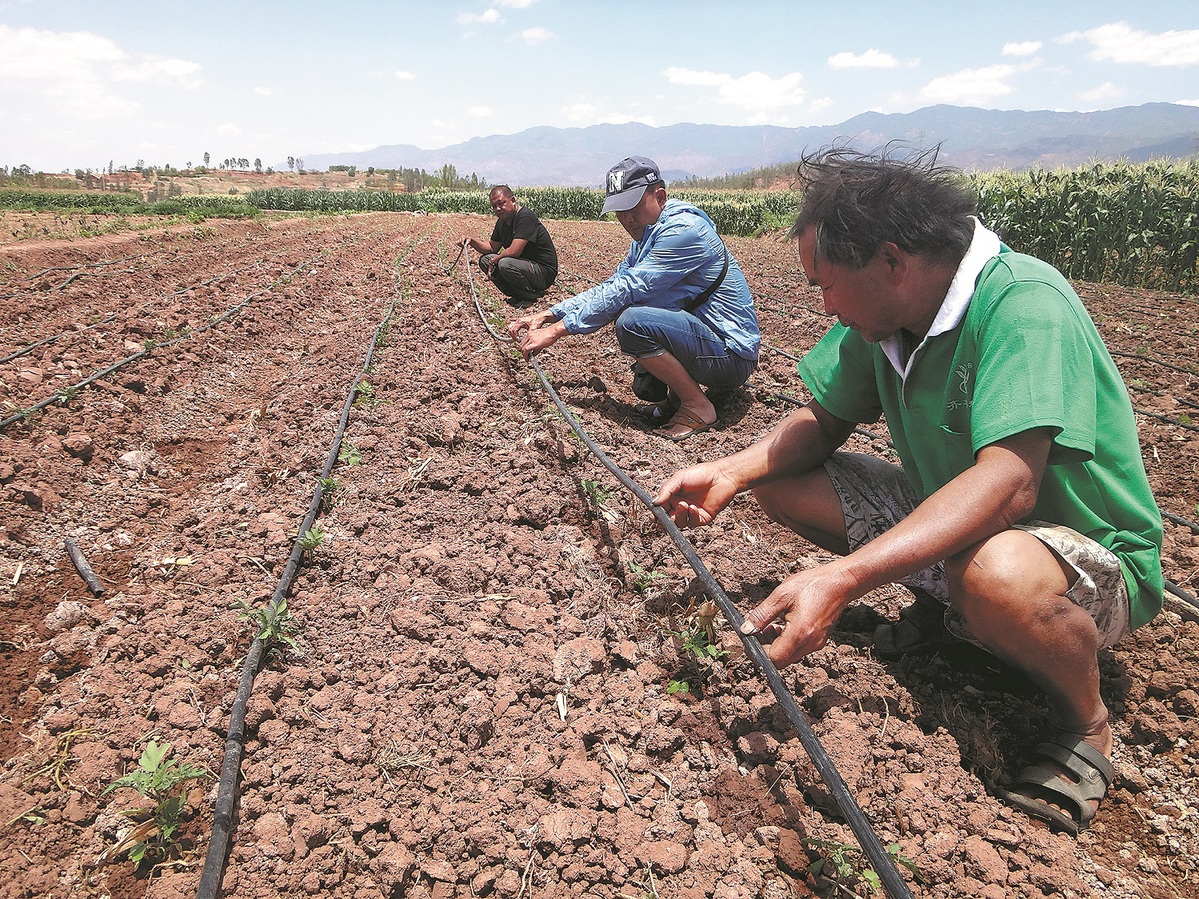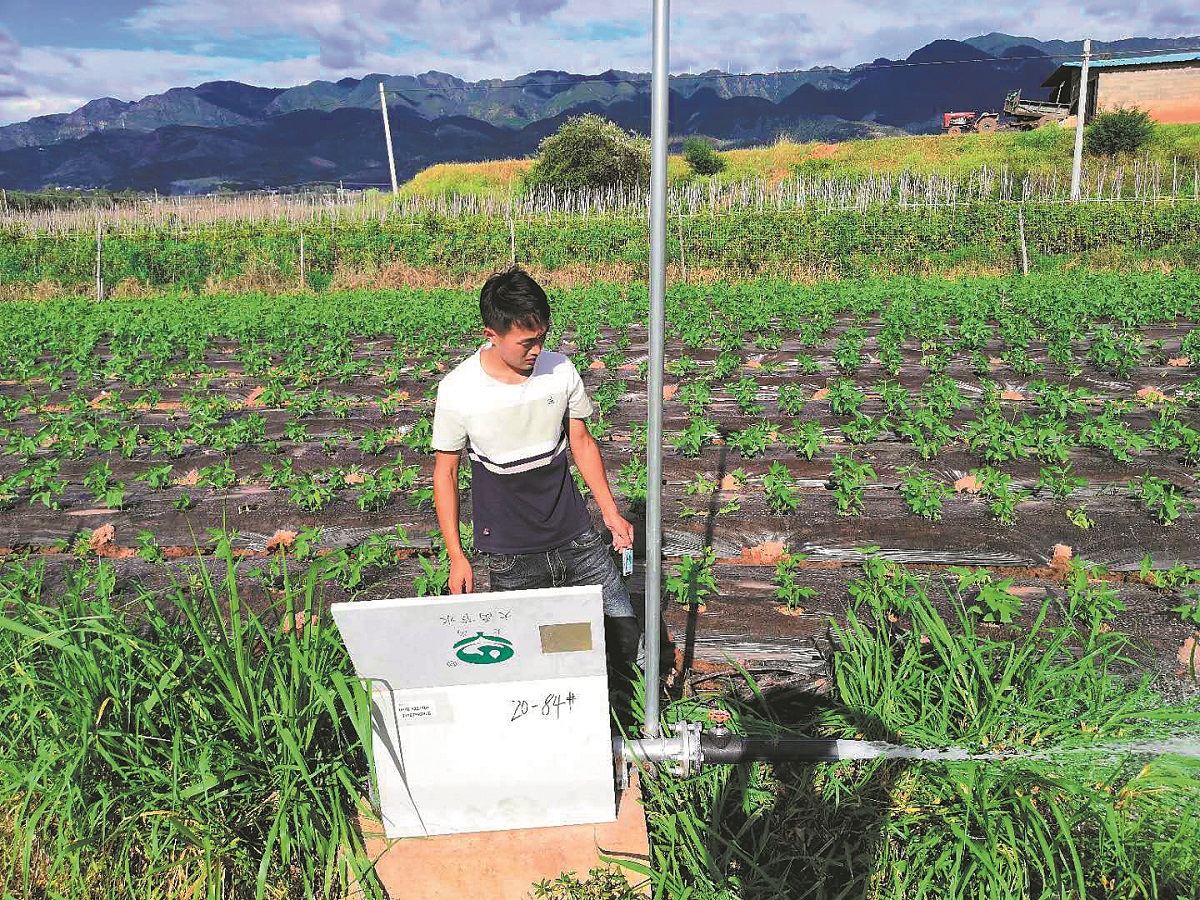中国日报网 2024-10-21 17:44:40

Editor's note: As protection of the planet's flora, fauna and resources becomes increasingly important, China Daily is publishing a series of stories to illustrate the country's commitment to safeguarding the natural world.
For generations, farmers in the Bingjian irrigation area in Yunnan province's Yuanmou county had to perform a laborious irrigation ballet, a delicate dance of cooperation and shared sacrifice heavily reliant on two reservoirs.
Every 15 to 20 days during the irrigation seasons, the reservoirs' sluice gates would open, bringing a sigh of relief to the farmers of the 7,600 hectares of farmland in the area, where the evaporation rate is six times that of rainfall. The water release, however, would only last for a week, forcing farmers to race against time to irrigate in turn, remaining ever vigilant against water theft.
"My family would join seven or eight other households to apply for permission to take water," said Liu Xianhua, a 41-year-old farmer from Yuelinglong village. Then, while one household irrigated, the others guarded the channels to prevent unauthorized withdrawals."
Farmers usually bought a permit to divert water into their farmland for a certain period of time, paying based on the time span and water velocity.
The mission of irrigating the farmlands for all the families was often a tiring and sleepless operation that stretched for a whole day and sometimes even longer, Liu said.
But now they have been unshackled from the tyranny of the shared water schedule, and are free to irrigate whenever their fields whisper their thirst. "With a mere swipe of a card, I can irrigate my farmland any time now," Liu smiled.
The change has come about as a result of a public-private partnership irrigation project, initiated in 2016 and put into operation in 2018.

Spearheaded by Dayu Irrigation Group Co, the project involved the construction of water diversion pipes and an intelligent water consumption management system that provides farmers with smart meters for 24-hour access to water. It has not only simplified irrigation but also transformed the once parched farmlands into reliable sources of income for farmers.
During traditional irrigation, officials used to face immense stress during water discharge periods, explained Zhou Jianqiang, deputy head of the Yuanmou Irrigation Management Bureau.
For seven days straight, over 20 officials had to join farmers patrolling the channel in the Bingjian area, each responsible for about 1 kilometer. They got some rest whenever possible in a small irrigation management house, he said.
However, water disputes still arose among villagers. Fueled by a desperate need to save their withering crops, these conflicts occasionally erupted into violence, the official said.
This project has not only significantly reduced the burden on irrigation officials but also eliminated factors that could potentially lead to water conflicts, Zhou said.
He emphasized, however, that the project wouldn't have been possible without the participation of Dayu Irrigation Group, which contributed nearly 48 percent of the total investment of 308 million yuan ($43.4 million).
"Funding this project solely through government investment would have been a challenge," he said.
Additionally, Dayu possesses extensive experience in operating such modern irrigation systems, he added. Their advanced technology allows for real-time monitoring of the water pressure and flow rate in pipes, alerting for leaks, and also statistically calculating water consumption and fees.
Compared to traditional flood irrigation, the new pipeline irrigation system, which makes it possible for farmers to bring in drip irrigation equipment, reduces water consumption by approximately 225 to 300 cubic meters per hectare. Overall, this translates to an annual water saving of 21 million cubic meters, roughly equivalent to the storage capacity of a medium-sized reservoir, he said.
During a persistent drought in August, a daily supply of 50,000 tons of water was provided through the system, ensuring a one-month buffer to support farmers in their fight against the dry spell, he said. This extended support, despite resource constraints, significantly aids in mitigating the impact of droughts.
"Without the irrigation project, we would be confronted with a much grimmer drought relief situation this year," he said.
For the Bingjian area, the irrigation management bureau now only needs to facilitate water diversion to ensure irrigation supply, though it also sometimes helps the Dayu company with water disputes, according to Zhou.
Managing the extensive irrigation system with 34 water diversion stations is no small feat for the 24 employees at Dayu's branch in Yuanmou. However, a cooperative mechanism involving water users not only facilitates project management but also empowers them economically, explained Bi Jinxiang, an employee with the branch company.
Some project pipelines are located beneath agricultural land, leading to the potential issue of leakages requiring digging and potential crop damage during repairs. Some farmers have demanded excessive compensation for damaged crops, causing disputes, she said.
She said the cooperative structure comprises 16 village branches headed by the respective village Party chiefs, and these groups play a crucial role in managing disputes within the project.
As Bi mentioned, this structure was instrumental in resolving disputes like crop compensation claims during leak repairs, as the respected Party chiefs facilitated more reasonable and fair compensation settlements based on actual losses.

"Villagers can participate as shareholders in the cooperative by investing a minimum share capital of 100 yuan. This provides them with a guaranteed annual return of at least 4.95 percent, regardless of the project's profitability, as assured by Dayu," she noted.
Zhang Zhijiao, the cooperative's director-general, reported that their share capital has reached 3.75 million yuan, and, to date, they have distributed over 730,000 yuan in dividends to shareholders.
Beyond assisting with water disputes, the cooperative promotes the use of integrated water and fertilizer technologies and provides agricultural materials as income-generating activities.
Zhang noted that the Bingjian area has witnessed a significant increase in land rent prices due to improved irrigation conditions. The price per hectare has risen from a previous maximum of 15,000 yuan to 45,000 yuan.
He said a growing trend of people from outside Yunnan are leasing land in the Bingjian area for agricultural planting businesses, lured by the convenience of irrigation.
The project has made farming much easier, Zhang said, adding he still runs a small farm while working with the cooperative.
"With a simple swipe of the card, I activate the irrigation system after arriving home from work and then I enjoy my supper. It frees me to attend to other things without interruption," he said.
Yang Haijiang, deputy head of Yuanmou's agriculture and rural affairs bureau, highlighted the transformative impact of the project, saying it has revolutionized the farming landscape in the Bingjian area.
Previously, restricted to cultivating grain crops like maize and harvesting only twice a year, local farmers faced limited market opportunities. The project, however, has dramatically altered this scenario, he emphasized.
With access to reliable irrigation, farmers can now diversify their crops, venturing into high-value options like tomatoes, cucumbers and grapes. This allows for an impressive four harvests annually, significantly boosting their earnings.
"Furthermore, the consistent water supply empowers farmers with the flexibility to adapt their planting choices based on market demands. This agility ensures they capitalize on the most profitable opportunities, leading to increased economic gains," he said.

He elaborated that a single hectare of farmland now yields 25 to 26 percent more produce than before, translating to a substantial 17-percent rise in income for the farmers.
In the midst of this agricultural revolution stands Zeng Zhe, a grape farmer from Yongzhou, Hunan province, whose journey epitomizes the project's positive impact.
Attracted by the favorable weather conditions in Yuanmou, Zeng leased almost half a hectare of land for grape planting in the Bingjian area in 2017. Thanks to the great irrigation conditions created by the project, the 31-year-old has gradually expanded his vineyard to 2 hectares, which brings his family a stable net income of 600,000 yuan annually.
"Access to piped water was pivotal in expanding my grape cultivation, boosting profits and productivity," he said.
Despite this, he also dug a borehole to get water and a small pond to store water for irrigation. But these facilities can only guarantee irrigation for about half a hectare of grapes, he said.
In the case of a heavy drought, he would hardly be able to manage to constantly pump water from the borehole, he said.
Considering the huge benefits of the project, the Yuanmou authorities, in cooperation with the Dayu company, are expanding the piped irrigation system to another 5,730 hectares of farmland, according to Yang, the agriculture and rural affairs official.
Construction on the new project is expected to be completed by the end of this year, he said.
With these irrigation facilities, he is even more hopeful for the future agricultural development of Yuanmou.
"While promoting traditional agricultural development, in the last five years we have devoted efforts to boost the agricultural breeding industry, and we're also striving to become a pioneer in the country's campaign of vitalizing the seed industry," he said.
责编:冯宇轩
一审:冯宇轩
二审:唐煜斯
三审:秦慧英
来源:中国日报网
我要问



 下载APP
下载APP 报料
报料 关于
关于
 湘公网安备 43010502000374号
湘公网安备 43010502000374号